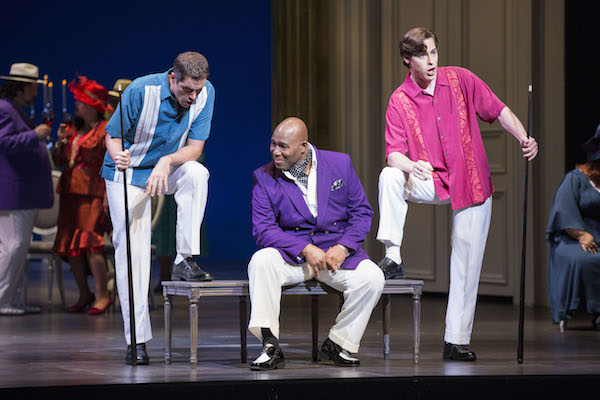
Cosi Fan Tutte: Appearances are deceiving
By Sebastian Spreng, Visual Artist and Classical Music Writer
It’s not a farce or a comedy or, much less, a divertimento. To be precise, it is a tragic farce, a cynical comedy and a sinister divertimento, a metaphor that lays bare the human condition beneath a cloak of compassion that fails to conceal Amadeus’ derisive cackle. More than a century later, an elderly Verdi expressed a similar vision, concluding his Falstaff with the line: “Everything in the world is a joke.”
Photo by Rod Milligon, FGO
But the Mozart of Così fan tutte goes deeper than that, you must read between the lines. Here we find neither the mysticism of The Magic Flute nor the carnality of Don Giovanni nor the social commentary of The Marriage of Figaro, but a caustic view of human nature masked by smiles and the most politically incorrect title in the history of opera, literally, “That’s What All Women Do.” The fact is “that’s what we all do” in this “school for lovers” (the opera’s subtitle) that is, in the final analysis, the school of life. No one is spared the scalpel wielded by Mozart and librettist Lorenzo da Ponte as it cuts through to what – for good or ill – never changes, because it is inherent to our condition.
Everything in Così is disguise, the biggest being to pretend the work’s thesis is simple when it is in fact as elusive as it is treacherous – alibis, affectations, sentimentality, posturing and exaggeration notwithstanding. For a product to avoid being banal, tedious, bland or ridiculous, each element must be well defined and in perfect balance with the others. Mozart’s product is stylistically rigorous. Each character is a distinct entity, yet they all come together to form a harmonious whole. Beyond the happy moral of the story with which the composer and the librettist leave us, the unease that afflicts the main characters at the end is what must stay with the audience. Otherwise, the authors’ message has not been communicated. Unlike other composers, Mozart masks, but does not allow himself to be masked.
It’s a monumental task for a young cast to venture into such a subtle and fierce Mozart opus. In Maria Callas’ wise words: “you can’t sing it on your tiptoes.” It requires not only talent but also solid technique and the ease that comes from experience. The Fiordiligi character calls to mind the impossible standard Richard Strauss set for Salome, “a 16-year-old Isolde.” Otherwise, you would have to harken back to the first FIordiligi, Adriana Ferrarese, the haughty star of the 1790 Viennese premiere, on whom Mozart wreaked vengeance by writing two hellishly difficult arias for her.
The cast assembled by the Florida Grand Opera gave the production its all, facing the challenge with determination and courage. Even though some of the singers exhibited voices at times excessively open or uneven, the ensemble worked effectively, in large measure thanks to the flexible musical framework provided by Ramon Tebar. Keeping up a brisk or slow pace attentive to his singers, he drew from the orchestra precise and sharp sound, closer to a period performance. The sound fit well with the action, conventionally directed by Bernard Uzan on suggestive sets designed by Ricardo Hernández for the 2007 version.
Uzan took certain unsuccessful liberties with the libretto, such as adding characters that detracted from the story’s intimacy. A stereotyped Despina, for example, directed an army of servants, acting more like a third sister. Other misses were the use of eclectic costumes of doubtful taste, especially on chorus members and extras, an apparent attempt at modernity that was as useless as it was incoherent. Fortunately, Uzan chose to let us enjoy the sparkling overture before the curtain went up, avoiding the insufferable practice of staging contemporary skits that mime the plot, presumably to entertain distractible theatergoers.
Masterful, ambiguous, difficult Così exposes ambitions, excesses, small triumphs and large failures. This school for lovers is the harshest of institutions, one in which you have to learn just to avoid giving in, in which a wise schoolmaster mocks you behind a mask of kindness. That’s what we all do, or rather, that’s the way we all are, and let he who is without sin cast the first stone.
Così fan tutte – Florida Grand Opera – Adrienne Arsht Center in Miami, Broward Center in Fort Lauderdale; fgo.org; 800-741-1010
Recent Content
-
Artsarticle ·
-
Artsarticle ·
-
Artsarticle ·
